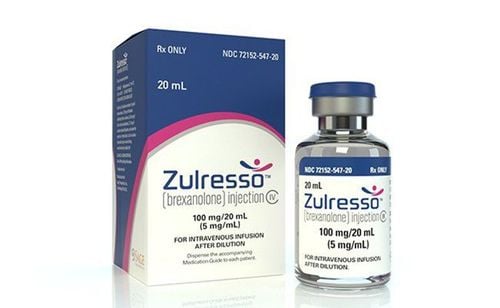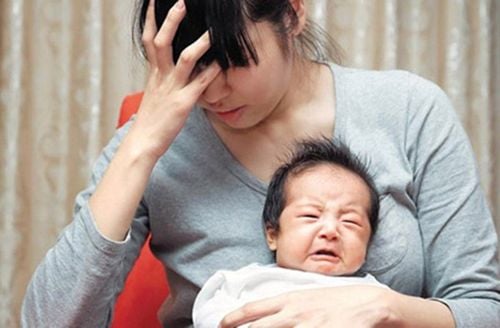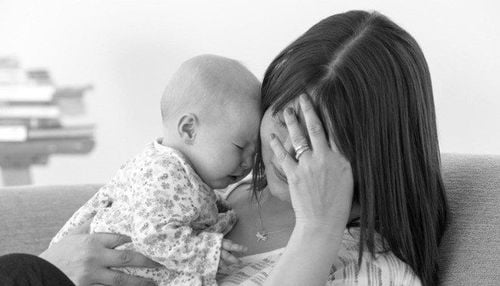This is an automatically translated article.
The article was professionally consulted by Specialist Doctor II Pham Thi Tuyet Mai - Obstetrician and Gynecologist - Department of Obstetrics and Gynecology - Vinmec Hai Phong International General Hospital.Women after having a baby are at a higher risk of developing depression. When depressed, the mother is often pessimistic, anxious, and changes behavior. If the disease is not treated in time, it can affect both mother and baby.
1. Is postpartum depression dangerous?
Postpartum depression is the type of depression you may experience after the birth of your baby. The illness can start any time during the first year of a baby's birth. If you have this condition, you will feel sad, hopeless, and guilty because you don't want to bond with or care for your baby.Postpartum depression can have major effects on both mother and baby. Some consequences of postpartum depression from mild to severe can be listed as follows:
When the mother has postpartum depression, the mother has insomnia, loss of appetite, making her health, mental and intellectual decline. lack of clarity, affecting work and daily life. The mother does not want to be close, talking to the baby makes the baby lack love and care from the mother, gradually affecting the ability to develop and intellectual. Psychiatric disorders: Signs of postpartum psychosis include confused thoughts, mood swings, hallucinations, paranoia... Murder of your baby: This is the most serious threat when a mother is suffering from mental illness. postpartum depression. Mothers who give birth unexpectedly, use drugs, or have a grudge against the child's father often have this behavior. In many cases, mothers kill their children and then commit suicide.

Khi bị trầm cảm sau sinh, người mẹ bị mất ngủ, chán ăn khiến cho sức khỏe sa sút
2. Signs of postpartum depression
If you have at least 5 of the following symptoms and last for at least 2 weeks or have emotional changes, you may have postpartum depression:Frequent feelings of sadness, feelings of emptiness, hopelessness; decreased interest in daily activities; reduced ability to think/concentrate, unable to make decisions. Insomnia or sleeping a lot; fatigue, feeling low on energy almost every day; angry and violent Changes in body weight in 1 month even without dieting to lose weight or following a weight gain diet. Regularly eating more or less than usual each day. Feeling worthless, disoriented; feelings of worthlessness, shame, guilt, or inadequacy of self Frequent thoughts of death, repeated suicidal thoughts. Treatment for postpartum depression depends a lot on when the disease is detected. Therefore, please pay special attention to the mother after giving birth to limit the risk of depression and other unfortunate consequences.

Bệnh trầm cảm sau sinh có thể gây ra những tác hại lớn đến cả người mẹ và em bé
3. Treatment and prevention of postpartum depression
3.1. Postpartum depression treatmentMothers with postpartum depression should seek advice from a mental health professional or psychologist to use cognitive behavioral therapy or interactive therapy. Daily exercise, relaxation, more contact with people... will bring about a therapeutic effect. Using drugs to treat postpartum depression has an inhibitory effect on the brain, regulating mood. The use of postpartum antidepressants should be reviewed and prescribed by a doctor. Mothers with postpartum depression should breastfeed more often to bond between mother and child. However, if during the course of treatment, it is necessary to use medicine, the mother should stop breastfeeding to ensure the safety and health of the baby. One of the key factors in successful treatment of depression is early detection and knowing when a woman needs help. 3.2. Prevention of postpartum depression
Experts recommend that, to prevent postpartum depression, families need to encourage, close and share with the woman about the birth process as well as taking care of the baby. Prepare yourself mentally: The first months of motherhood will be very stressful, but often they do not anticipate what those stresses will be. Therefore, learn from these experiences from those who have gone before. Those who are about to become mothers often feel anxious and pressured, and if repressed for a long time, it can affect the mother's psychology. So if you are feeling too worried and can't solve your own psychological problems, you should share it with others. Many children have a habit of staying up at night, preferring to be held in their arms, causing their mothers to fall asleep. Lack of sleep makes the mother's mind stressed, so she is more prone to depression. So take advantage of a nap when your baby sleeps Exercise has a great effect on helping mothers avoid depression. Never feel guilty for not being a perfect mother because there will be no perfect mother. You can learn to teach baby care skills. Lack of social interaction is one of the factors that put you at risk of postpartum depression. Therefore, you should join groups of new mothers to share and learn from each other's experiences.

Người mẹ bị trầm cảm sau sinh cần được sự tư vấn từ chuyên gia sức khỏe tâm thần
Dr. Tuyet Mai has over 30 years of experience in examination and treatment in the field of Obstetrics and Gynecology, especially in lower-line surgery, family planning, specialized laparoscopic surgery, and multi-surgery management. severe and difficult such as:
Hysterectomy, hymenectomy Surgery for uterine fibroids, cervical cancer Cervical cancer vaccination Cervical cancer early detection Cervical electrocautery Examination and treatment Endocrinology treatment To register for examination and treatment at Vinmec International General Hospital, you can contact Vinmec Health System nationwide, or register online HERE.














